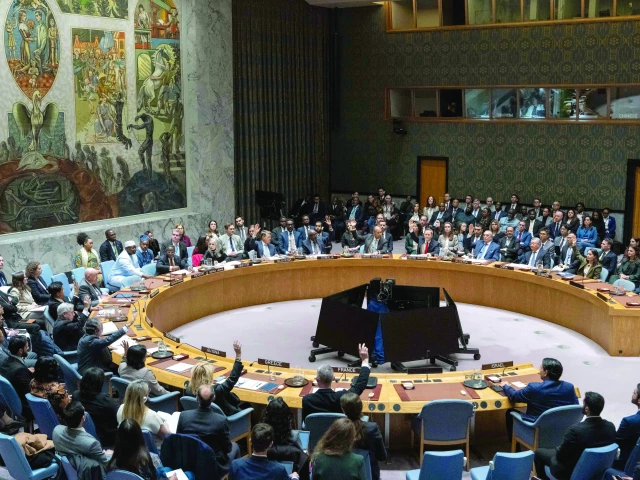Divided views greet UN approval of Gaza plan
Security Council votes 13-0 on Trump proposals; Pakistan, Russia, China raise concerns over statehood

The UN Security Council's endorsement of US President Donald Trump's Gaza peace plan has generated sharp reactions across capitals, with Israel embracing the initiative while Hamas and several states warned it falls short of elaborating a pathway to a viable Palestinian state.
The UNSC approved the US-drafted text by a 13-0 vote, with China and Russia abstaining, authorising a transitional 'Board of Peace' to oversee Gaza's reconstruction until 2027 and enabling an International Stabilisation Force (ISF) tasked with managing security, redevelopment and humanitarian access across the enclave.
The text welcomes the 20-point Comprehensive Plan announced by President Trump on September 29, whose opening measures led to the October ceasefire between Israel and Hamas. Diplomats said the plan's acceptance helped halt active fighting and enabled a partial easing of humanitarian pressures.
Pakistan's Permanent Representative Ambassador Asim Iftikhar Ahmad commended the plan's attempt to stop the bloodshed, maintain the fragile ceasefire and secure the full withdrawal of Israeli occupation forces, calling these elements essential to stabilising the battered territory after months of devastation.
At the same time, he stressed, the Board of Peace was only a "transitional oversight mechanism" whose mandate ends in 2027, saying that "the executive and administrative authority in Gaza must remain with the Palestinians through a Palestinian Committee" responsible for governance and recovery.
"Establishment of a sovereign, independent and contiguous State of Palestine," Ambassador Asim Iftikhar Ahmad said, "must be the ultimate objective, and the culmination, of any peace process or initiative on the Middle East," urging firm alignment with long-standing international legal principles.
The resolution authorises the Board to establish a temporary ISF "to deploy under unified command acceptable to the Board", noting that Muslim countries will contribute personnel in coordination with Egypt and Israel to support security and civilian protection arrangements during the transition.
US Ambassador Mike Waltz said the ISF "will stabilise security environment, support the demilitarisation of Gaza, dismantle terrorist infrastructure, decommission weapons and maintain the safety of Palestinian civilians," describing it as essential to preventing renewed fighting or militant regrouping.
China and Russia did not vote but allowed the resolution to pass. They criticised what they called major gaps in the text, warning that it sidelines the UN, lacks clear affirmation of Palestinian sovereignty, and offers insufficient clarity on the Board's structure, mandate and long-term authority in Gaza.
China's Ambassador Fu Cong voiced "deep worry" that the draft was vague on the ISF and the Board's powers, while Russia's Ambassador Vasily Nebenzy said the resolution risked enabling United States and Israeli "experiments" that historically produced consequences opposite to their stated goals.
Throughout the negotiations, Pakistan supported Arab Group proposals submitted by Algeria and advanced its own amendments, thanking the US for incorporating some points. However, it said critical suggestions were omitted, including a defined path to statehood and an enhanced UN role in governance.
Ambassador Asim Ahmad hoped further details expected in coming weeks must clarify the political horizon, affirming that existing Security Council resolutions, and addressing the Palestinian Authority's central role
He emphasised that breaking the cycle of violence requires ending occupation and ensuring a credible, time-bound route to statehood. "Durable peace and stability in the region will come only with the establishment of the Palestinian State as part of the two-State solution."
Hamas rejected the resolution outright, arguing that it undermines Palestinian political and humanitarian rights and warning that an international force with broad powers could amount to a form of trusteeship. The group accused Israel of exploiting the process to avoid core political concessions.
Israel welcomed the plan as a framework for stability, saying it advances demilitarisation, disarmament and deradicalisation in Gaza. Prime Minister Benjamin Netanyahu reiterated his opposition to Palestinian statehood even as officials said the plan could expand cooperation with neighbouring states.
Residents in Gaza and Israel expressed cautious hope that the ceasefire and new mechanisms might improve conditions, though many questioned whether deep political divisions, limited trust and unclear timelines could impede real progress after decades of conflict and intermittent negotiations.



1724319076-0/Untitled-design-(5)1724319076-0-208x130.webp)


















COMMENTS (1)
Comments are moderated and generally will be posted if they are on-topic and not abusive.
For more information, please see our Comments FAQ